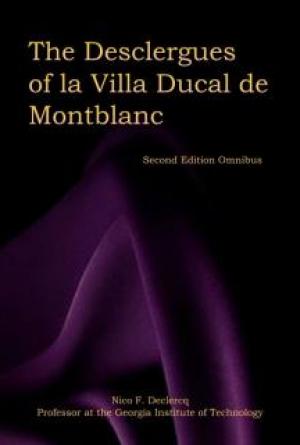1796.
ACCOUNT OF SAPPHO.
SAPPHO, whom the ancients distinguished by the title of the TENTH MUSE, was born at Mytilene in the island of Lesbos, six hundred years before the Christian era. As no particulars have been transmitted to posterity, respecting the origin of her family, it is most likely she derived by little consequence from birth of connection. At an early period of her life she was wedded to Cercolus, a native of the isle of Andros; he was possessed of considerable wealth, and though the Lesbian Muse is said to have been sparingly gifted with beauty, he became enamoured of her, more perhaps on account of mental, than personal charms. By this union she is said to have given birth to a daughter; but Cercolus leaving her, while young, in a state of widowhood, she never after could be prevailed on to marry.
The Fame which her genius spread even to the remotest parts of the earth, excited the envy of some writers who endeavoured to throw over her private character, a shade, which shrunk before the brilliancy of her poetical talents. Her soul was replete with harmony, that harmony which neither art nor study can acquire; she felt the intuitive superiority, and to the Muses she paid unbounded adoration.
The Mytilenians held her poetry in such high veneration, and were so sensible of the hour conferred on the country which gave her birth, that they coined money with the impression of her head; and at the time of her death, paid tribute to their memory, such as was offered to sovereigns only.
The story of Antiochus has been related as an unequivocal proof of Sappho‘s skill in discovering, and powers of describing the passions of the human mind. That prince is said to have entertained a fatal affection for his mother-in-law Stratonice; which, though he endeavoured to subdue it‘s influence, preyed upon his frame, and after many ineffectual struggles, at length reduced him to extreme danger. His physicians marked the symptoms attending his malady, and found them so exactly correspond with Sappho‘s delineation of the tender passion, that they did not hesitate to form a decisive opinion of the cause, which had produced so perilous an effect.
That Sappho was not insensible to the feelings she so well described , is evident in her writings but it was scarcely possible, that a mind so exquisitely tender, so sublimely gifted, should escape those fascinations which even apathy itself has been awakened to acknowledge.
The scarce specimens now extant, from the pen of the Grecian Muse, have by the most competent judges been esteemed as the standard for the pathetic, the glowing, and the amatory. The ode, which has been so highly estimated, is written in a measure distinguished by the title of the Sapphic. POPE made it his model in his juvenile production, beginning—
“Happy the man—whose wish and care“—
Addison was opinion, that the writings of Sappho were replete with such fascinating beauties, and adorned with such a vivid glow of sensibility, that, probably, had they been preserved entire, it would have been dangerous to have perused them. They possessed none of the artificial decorations of a feigned passion; they were the genuine effusions of a supremely enlightened soul, laboring to subdue a fatal enchantment; and vainly opposing the conscious pride of illustrious fame, against the warm susceptibility of a generous bosom.
Though few stanzas from the pen of the Lesbian poetess have darted through the shades of oblivion: yet, those that remain are so exquisitely touching and beautiful, that they prove beyond dispute the taste, feeling, and inspiration of the mind which produced them.
In examining the curiosities of antiquity, we look to the perfections, and not the magnitude of those relics, which have been preserved amidst the wrecks of time: as the smallest gem that bears the fine touches of a master, surpasses the loftiest fabric reared by the labours of false taste, so the precious fragments of the immortal Sappho, will be admired, when the voluminous productions of inferior poets are mouldered into dust.
When it is considered, that the few specimens we have of the poems of the Grecian Muse, have passed through three and twenty centuries, and consequently through the hands of innumerable translators: and when it is known that Envy frequently delights in the base occupation of depreciating merit which it canot aspire to emulate; it may be conjectured, that some passages are erroneously given to posterity, either by ignorance or design. Sappho, whose fame beamed round her with the superior effulgence which her works had created, knew that she was writing for future ages; it is not therefore natural that she should produce any composition which might tend to tarnish her reputation, or lessen that celebrity which it was the labour of her life to consecrate. The delicacy of her sentiments cannot find a more eloquent advocate than in her own effusions; she is said to have commended in the most animated panegyric, the virtues of her brother Lanychus; and with the most pointed and severe censure, to have contemned the passion which her prother Charaxus entertained for the beautiful Rhodope. If her writings were, in some instances, too glowing for the fastidious refinement of modern times; let it be her excuse, and the honour of her country, that the liberal education of the Greeks was such, as inspired them with an unprejudiced enthusiasm for the works of genius: and that when they paid adoration to Sappho, they idolized the MUSE, and not the WOMAN.
I shall conclude this account with an extract from the works of the learned and enlightened Abbe‘ Barthelemi; at once the vindication and eulogy of the Grecian Poetess.
“Sappho undertook to inspire the Lesbian women with a taste for literature; many of them received instructions from her, and foreign women increased the number of her disciples. She loved them to excess, because it was impossible for her to love otherwise; and she expressed her tenderness in all the violence of passion: your surprize at this will cease, when you are acquainted with the extreme sensibility of the Greeks; and discover, that amongst them the most innocent connections often borrow the impassioned language of love.
“A certain facility of manners, she possessed; and the warmth of her expressions were but too well calculated to expose her to the hatred of some women of distinction, humbled by her superiority; and the jealousy of some of her disciples, who happened to be the objects of her preference. To this hatred she replied by truths and irony, which completely exasperated her enemies. She repaired to Sicily, where a statue was erected to her; it was sculptured by SILANION, one of the most celebrated staturists of his time. The sensibility of SAPPHO
was extreme! she loved PHAON, who forsook her; after various efforts to bring him back, she took the leap of Leucata, and perished in the waves!
“Death has not obliterated the stain imprinted on her character; for ENVY, which fastens on ILLUSTRIOUS NAMES, does not expire; but bequeaths her aspersions to that calumny which NEVER DIES.
“Several Grecian women have cultivated POETRY, with success, but none have hitherto attained to the excellence of SAPPHO. And among other poets, there are few, indeed, who have surpassed her.“
THE SUBJECT OF EACH SONNET.
~~~~~~
I.
INTRODUCTORY.
II.
The temple of Chastity.
III.
The Bower of Pleasure.
IV.
Sappho discovers her Passion.
V.
Contemns its Power.
VI.
Describes the characteristics of Love.
VII.
Invokes Reason.
VIII.
Her Passion increases.
IX.
Laments the volatility of Phaon.
X.
Describes Phaon.
XI.
Rejects the Influence of Reason.
XII.
Previous to her Interview with Phaon.
XIII.
She endeavours to fascinate him.
XIV.
To the Aeolian Harp.
XV.
Phaon awakes.
XVI.
Sappho rejects Hope.
XVII.
The Tyranny of Love.
XVIII.
To Phaon.
XIX.
Suspects his constancy.
XX.
To Phaon.
XXI.
Laments her early Misfortunes.
XXII.
Phaon forsakes her.
XXIII.
Sappho‘s Conjectures.
XXIV.
Her Address to the Moon.
XXV.
To Phaon.
XXVI.
Contemns Philosophy.
XXVII.
Sappho‘s Address to the Stars.
XXVIII.
Describes the fascinations of Love.
XXIX.
Determines to follow Phaon.
XXX.
Bids farewell to Lesbos.
XXXI.
Describes her Bark.
XXXII.
Dreams of a Rival.
XXXIII.
Reaches Sicily.
XXXIV.
Sappho‘s Prayer to Venus.
XXXV.
Reproaches Phaon.
XXXVI.
Her confirmed Despair.
XXXVII. Foresees her Death.
XXXVIII. To a Sigh.
XXXIX.
To the Muses.
XL.
Visions appear to her in a dream.
XLI.
Resolves to take the Leap of Leucata.
XLII.
Her last Appeal to Phaon.
XLIII.
Her Reflections on the Leucadian Rock before she
perishes.
XLIV.
Sonnect Conclusive.
“FLENDUS AMOR MEUS EST; ELEGEIA FLEBILE CARMEN;
NON FACIT AD LACRYMAS BARBITOS ULLA MEAS.“
Ovid.
“Love taught my tears in sadder notes to flow,
And tun‘d my heart to elegies of woe.“
Pope.
Sappho and Phaon
SONNET INTRODUCTORY
~~~~~~~~~~~~~~~~
FAVOUR‘D by Heav‘n are those, ordain‘d to taste
The bliss supreme that kindles fancy‘s fire;
Whose magic fingers sweep the muses‘ lyre,
In varying cadence, eloquently chaste!
Well may the mind, with tuneful numbers grac‘d,
To Fame‘s immortal attributes aspire,
Above the treach‘rous spells of low desire,
That wound the sense, by vulgar joys debas‘d.
For thou, blest POESY! with godlike pow‘rs
To calm the miseries of man wert giv‘n;
When passion rends, and hopeless love devours,
By mem‘ry goaded, and by frenzy driv‘n,
‘Tis thine to guide him ‘midst Elysian bow‘rs,
And shew his fainting soul,—a glimpse of Heav‘n.
SONNET II.
~~~~~~~~~~~~~~~~
HIGH on a rock, coaeval with the skies,
A Temple stands, rear‘d by immortal pow‘rs
To Chastity divine! ambrosial flow‘rs
Twining round icicles, in columns rise,
Mingling with pendent gems of orient dyes!
Piercing the air, a golden crescent tow‘rs,
Veil‘d by transparent clouds; while smiling hours
Shake from their varying wings—celestial joys!
The steps of spotless marble, scatter‘d o‘er
With deathless roses arm‘d with many a thorn,
Lead to the altar. On the frozen floor,
Studded with tear-drops petrified by scorn,
Pale vestals kneel the Goddess to adore,
While Love, his arrows broke, retires forlorn.
1
Sappho and Phaon
SONNET III.
~~~~~~~~~~~~~~~~
TURN to yon vale beneath, whose tangled shade
Excludes the blazing torch of noon-day light,
Where sportive Fawns, and dimpled Loves invite,
The bow‘r of Pleasure opens to the glade:
Lull‘d by soft flutes, on leaves of violets laid,
There witching beauty greets the ravish‘d sight,
More gentle than the arbitress of night
In all her silv‘ry panoply array‘d!
The birds breathe bliss! light zephyrs kiss the ground, Stealing the hyacinth‘s divine perfume;
While from the pellucid fountains glitt‘ring round, Small tinkling rills bid rival flow‘rets bloom!
HERE, laughing Cupids bathe the bosom‘s wound;
THERE, tyrant passion finds a glorious tomb!
SONNET IV
~~~~~~~~~~~~~~~~
WHY, when I gaze on Phaon‘s beauteous eyes,
Why does each thought in wild disorder stray?
Why does each fainting faculty decay,
And my chill‘d breast in throbbing tumults rise?
Mute, on the ground my Lyre neglected lies,
The Muse forgot, and lost the melting lay;
My down-cast looks, my faultering lips betray,
That stung by hopeless passion,—Sappho dies!
Now, on a bank of Cypress let me rest;
Come, tuneful maids, ye pupils of my care,
Come, with your dulcet numbers soothe my breast;
And, as the soft vibrations float on air,
Let pity waft my spirit to the blest,
To mock the barb‘rous triumphs of despair!
2
Sappho and Phaon
SONNET V.
~~~~~~~~~~~~~~
O! How can LOVE exulting Reason queil!
How fades each nobler passion from his gaze!
E‘en Fame, that cherishes the Poet‘s lays,
That fame, ill-fated Sappho lov‘d so well.
Lost is the wretch, who in his fatal spell
Wastes the short Summer of delicious days,
And from the tranquil path of wisdom strays,
In passion‘s thorny wild, forlorn to dwell.
O ye! who in that sacred Temple smile
Where holy Innocence resides enshrin‘d;
Who fear not sorrow, and who know not guile,
Each thought compos‘d, and ev‘ry wish resign‘d;
Tempt not the path where pleasure‘s flow‘ry wile
In sweet, but pois‘nous fetters, holds the mind.
SONNET VI.
~~~~~~~~~~~~~~~~
IS it to love, to fix the tender gaze,
To hide the timid blush, and steal away;
To shun the busy world, and waste the day
In some rude mountain‘s solitary maze?
Is it to chant one name in ceaseless lays, To hear no words that other tongues can say,
To watch the pale moon‘s melancholy ray,
To chide in fondness, and in folly praise?
Is it to pour th‘ involuntary sigh,
To dream of bliss, and wake new pangs to prove;
To talk, in fancy, with the speaking eye,
Then start with jealousy, and wildly rove;
Is it to loathe the light, and wish to die?
For these I feel,—and feel that they are Love.
3
Sappho and Phaon
SONNET VII.
~~~~~~~~~~~~~~~~
COME, Reason, come! each nerve rebellious bind,
Lull the fierce tempest of my fev‘rish soul;
Come, with the magic of thy meek controul,
And check the wayward wand‘rings of my mind:
Estrang‘d from thee, no solace can I find,
O‘er my rapt brain, where pensive visions stole,
Now passion reigns and stormy tumults roll—
So the smooth Sea obeys the furious wind!
In vain Philosophy unfolds his store,
O‘erwhelm‘d is ev‘ry source of pure delight;
Dim is the golden page of wisdom‘s lore;
All nature fades before my sick‘ning sight:
For what bright scene can fancy‘s eye explore,
‘Midst dreary labyrinths of mental night?
SONNET VIII.
~~~~~~~~~~~~~~~~
WHY, through each aching vein, with lazy pace
Thus steals the languid fountain of my heart,
While, from its source, each wild convulsive start Tears the scorch‘d roses from my burning face?
In vain, O Lesbian Vales! your charms I trace;
Vain is the poet‘s theme, the sculptor‘s art;
No more the Lyre its magic can impart,
Though wak‘d to sound, with more than mortal grace!
Go, tuneful maids, go bid my Phaon prove
That passion mocks the empty boast of fame;
Tell him no joys are sweet, but joys of love,
Melting the soul, and thrilling all the frame!
Oh! may th‘ecstatic thought in bosom move,
And sighs of rapture, fan the blush of shame!
4
Sappho and Phaon
SONNET IX.
~~~~~~~~~~~~~~~~
YE, who in alleys green and leafy bow‘rs,
Sport, the rude children of fantastic birth;
Where frolic nymphs, and shaggy tribes of mirth,
In clam‘rous revels waste the midnight hours;
Who, link‘d in flaunting bands of mountain flow‘rs, Weave your wild mazes o‘er the dewy earth,
Ere the fierce Lord of Lustre rushes forth,
And o‘er the world his beamy radiance pours!
Oft has your clanking cymbal‘s madd‘ning strain,
Loud ringing through the torch-illumin‘d grove,
Lur‘d my lov‘d Phaon from the youthful train,
Through rugged dells, o‘er craggy rocks to rove;
Then how can she his vagrant heart detain,
Whose Lyre throbs only to the touch of Love!
SONNET X.
~~~~~~~~~~~~~~~~
DANG‘ROUS to hear, is that melodious tongue,
And fatal to the sense those murd‘rous eyes,
Where in a sapphire sheath, Love‘s arrow lies,
Himself conceal‘d the crystal haunts among!
Oft o‘er that form, enamour‘d have I hung,
On that smooth cheek to mark the deep‘ning dyes,
While from that lip the fragrant breath would rise, That lip, like Cupid‘s bow with rubies strung!
Still let me gaze upon that polish‘d brow,
O‘er which the golden hair luxuriant plays;
So, on the modest lily‘s leaves of snow
The proud Sun revels in resplendent rays!
Warm as his beams this sensate heart shall glow,
Till life‘s last hour, with Phaon‘s self decays!
5
Sappho and Phaon
SONNET XI.
~~~~~~~~~~~~~~~~
O! Reason! vaunted Sovreign of the mind!
Thou pompous vision with a sounding name!
Can‘st thou, the soul‘s rebellious passions tame!
Can‘st thou in spells the vagrant fancy bind?
Ah, no! capricious as the wav‘ring wind,
Are sighs of Love that dim thy boasted flame,
While Folly‘s torch consumes the wreath of fame,
And Pleasure‘s hands the sheaves of truth unbind.
Press‘d by the storms of Fate, hope shrinks and dies; Frenzy darts forth in mightiest ills array‘d;
Around thy throne destructive tumults rise,
And hell-fraught jealousies, thy rights invade!
Then, what art thou? O! Idol of the wise!
A visionary theme!—a gorgeous shade!
SONNET XII.
~~~~~~~~~~~~~~~~
NOW, o‘er the tessellated pavement strew
Fresh saffron, steep‘d in essence of the rose,
While down yon agate column gently flows
A glitt‘ring streamlet of ambrosial dew!
My Phaon smiles! the rich carnation‘s hue,
On his flush‘d cheek in conscious lustre glows,
While o‘er his breast enamour‘d Venus throws
Her starry mantle of celestial blue!
Breathe soft, ye dulcet flutes, among the trees
Where clust‘ring boughs with golden citron twine;
While slow vibrations, dying on the breeze,
Shall soothe his soul with harmony divine!
Then let my form his yielding fancy seize,
And all his fondest wishes, blend with mine.
6
Sappho and Phaon
SONNET XIII.
~~~~~~~~~~~~~~~~
BRING, bring to deck my brow, ye Sylvan girls,
A roseate wreath; nor for my waving hair
The costly band of studded gems prepare,
Of sparkling crysolite or orient pearls:
Love, o‘er my head his canopy unfurls,
His purple pinions fan the whisp‘ring air;
Mocking the golden sandal, rich and rare,
Beneath my feet the fragrant woodbine curls.
Bring the thin robe, to fold about my breast,
White as the downy swan; while round my waist
Let leaves of glossy myrtle bind the vest,
Not idly gay, but elegantly chaste!
Love scorns the nymph in wanton trappings drest;
And charms the most concealed, are doubly grac‘d.
SONNET XIV.
~~~~~~~~~~~~~~~~
COME, soft Aeolian harp, while zephyr plays
Along the meek vibration of thy strings,
As twilight‘s hand her modest mantle brings,
Blending with sober grey, the western blaze!
O! prompt my Phaon‘s dreams with tend‘rest lays,
Ere night o‘er shade thee with its humid wings,
While the lorn Philomel his sorrow sings
In leafy cradle, red with parting rays!
Slow let thy dulcet tones on ether glide,
So steals the murmur of the am‘rous dove;
The mazy legions swarm on ev‘ry side,
To lulling sounds the sunny people move!
Let not the wise their little world deride,
The smallest sting can wound the breast of Love.
7
Sappho and Phaon
SONNET XV.
~~~~~~~~~~~~~~~~
NOW, round my favor‘d grot let roses rise,
To strew the bank where Phaon wakes from rest;
O! happy buds! to kiss his burning breast,
And die, beneath the lustre of his eyes!
Now, let the timbrels echo to the skies,
Now damsels sprinkel cassia on his vest,
With od‘rous wreaths of constant myrtle drest,
And flow‘rs, deep tinted with the rainbow‘s dyes!
From cups of porphyry let nectar flow,
Rich as the perfume of Phoenicia‘s vine!
Now let his dimpling cheek with rapture glow,
While round his heart love‘s mystic fetters twine; And let the Grecian Lyre its aid bestow,
In songs of triumph, to proclaim him mine!
SONNET XVI.
~~~~~~~~~~~~~~~~
DELUSIVE Hope! more transient than the ray
That leads pale twilight to her dusky bed,
O‘er woodland glen, or breezy mountain‘s head,
Ling‘ring to catch the parting sigh of day.
Hence with thy visionary charms, away!
Nor o‘er my path the flow‘rs of fancy spread;
Thy airy dreams on peaceful pillows shed,
And weave for thoughtless brows, a garland gay.
Farewell low vallies; dizzy cliffs, farewell!
Small vagrant rills that murmur as ye flow:
Dark bosom‘d labyrinth and thorny dell;
The task be mine all pleasures to forego;
To hide, where meditation loves to dwell,
And feed my soul, with luxury of woe!
8
Sappho and Phaon
SONNET XVII.
~~~~~~~~~~~~~~~~
Love steals unheeded o‘er the tranquil mind,
As Summer breezes fan the sleeping main,
Slow through each fibre creeps the subtle pain,
‘Till closely round the yielding bosom twin‘d.
Vain is the hope the magic to unbind,
The potent mischief riots in the brain,
Grasps ev‘ry thought, and burns in ev‘ry vein,
‘Till in the heart the Tyrant lives enshrin‘d.
Oh! Victor strong! bending the vanquish‘d frame;
Sw







